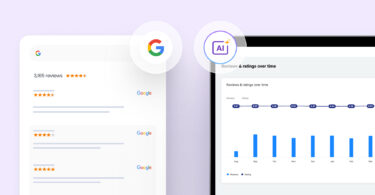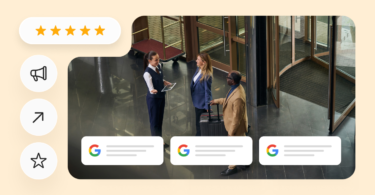Reviews play a critical role in the current business economy. A recent Birdeye study shows that:
- Over 90% of customers read at least two reviews before choosing a business
- 87% of customers refrained from engaging with a business that had negative reviews
These numbers might tempt some businesses to only seek reviews from happy customers, reducing the volume of submitting negative feedback on their profiles – a practice known as review gating.
However, Google outlawed review gating in 2018. It states that businesses shouldn’t discourage or prohibit negative reviews and solely collect only positive reviews from customers.
Birdeye strongly opposes review gating and ensures that all businesses using the platform give every customer a fair chance to post feedback publicly.
In this blog post, we explore the risks of review gating, Google’ policy against it, and how Birdeye’s review generation process promotes unbiased customer feedback.
Get More Customers with Birdeye Review Generation
Don’t gate review but get reviews ethically with Birdeye Social. Watch the Free Demo Now.
Table of contents
What is review gating?
Review gating is a review collection process where a company only sends review requests to happy customers. They filter out unhappy customers from the process and prevent negative reviews on popular review sites.
With review gating:
- Customers who say they had a positive experience, are redirected to a form so they can easily post an online review.
- Customers who say they had a negative experience are redirected to a private feedback form on the business’s website instead of posting publicly.
The result is a deceivingly positive rating for the business that may not represent the actual customer experience.
The trust economy relies on honest reviews to help customers make informed decisions by assessing business reputation and quality of service.
Review gating distorts the accuracy of these reviews, presenting an inflated positive image of a business while blocking negative reviews.
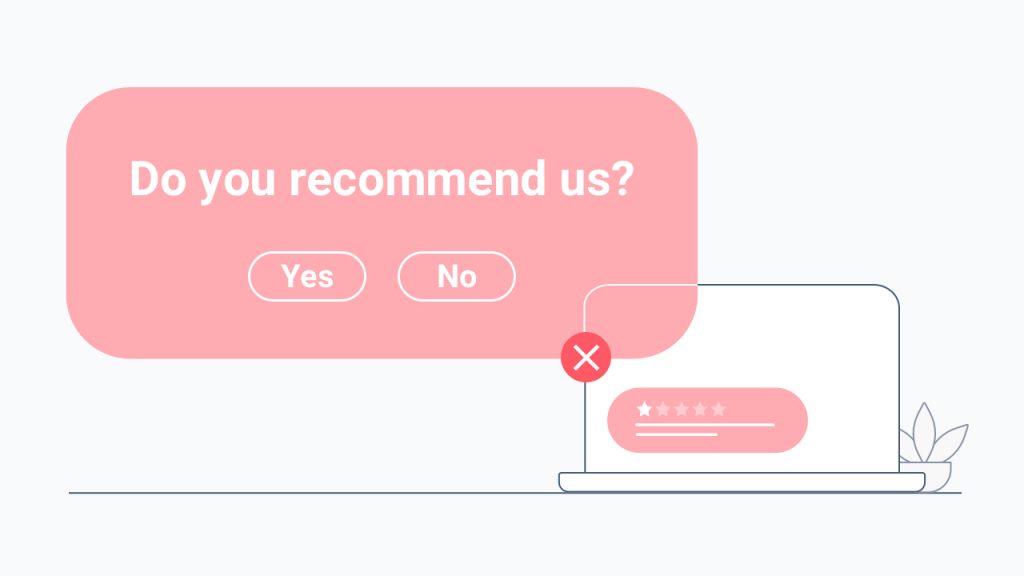
How do businesses gate reviews?
Businesses often “gate” reviews, and one unethical practice is selectively soliciting positive reviews. This involves only asking satisfied customers for feedback, damaging the overall perception. Here are a few examples:
- Using software to preface each review request with a sentiment question, such as: “Were you satisfied with your experience? Yes/No.” Based on the response, they send a review request to those who say “Yes”.
- Routing survey respondents to review sites based on their responses. Most survey companies allow businesses to set up “skip and display” logic, sending different questions to unhappy and happy customers. This way, businesses can get away with only asking happy customers for reviews.
- Asking only those customers who are likely to leave exclusively positive reviews to post publicly, while ignoring unsatisfied customers.
- Offering incentives for positive reviews. This results in biased positive feedback that won’t reflect real customer experiences.
Review gating example
Selectively asking customers for feedback or reviews based on their positive experiences can create a skewed perception of a company’s reputation.
Here’s an example of review gating:
Imagine a newly opened restaurant, “Taste Haven,” which wants to boost its online reputation. They implement a review gating strategy for their online review platforms to achieve this biased ratings.
The general positive review path:
- When a customer dines at Taste Haven and has a delightful experience, the staff encourages them to leave a review.
- The restaurant sends business cards or follow-up emails with links to review sites, specifically requesting positive feedback.
- If the customer clicks on the link and gives a positive review, they are directed to the respective review platform to share their experience.
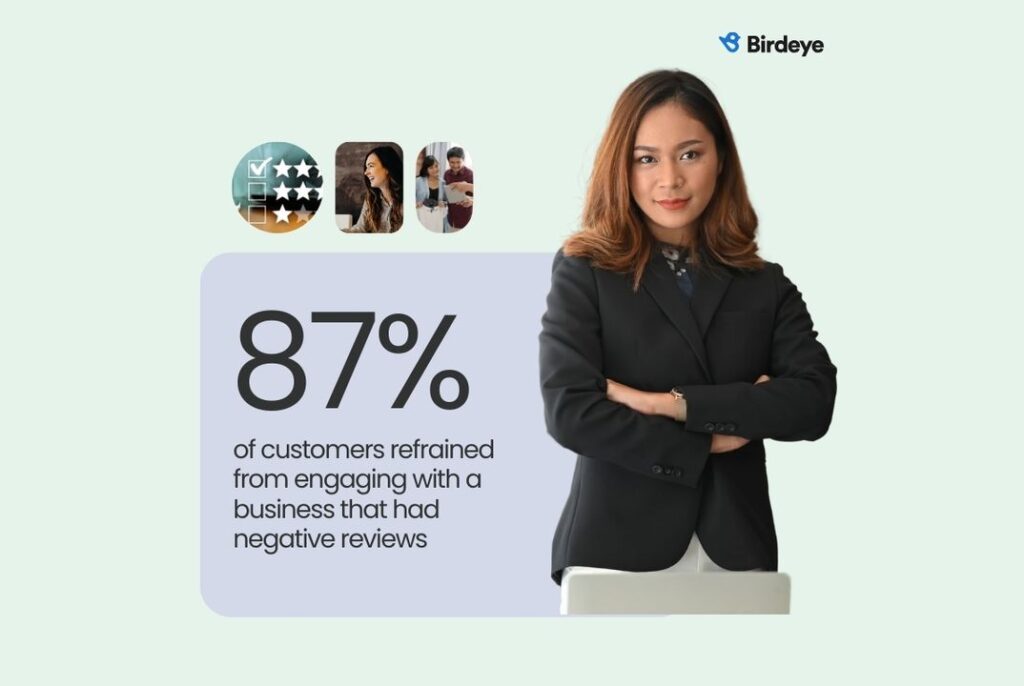
Negative review path:
- If a customer has a negative experience, the staff doesn’t ask for feedback or direct them to review sites.
- Instead, the restaurant management may reach out to the disgruntled customer to resolve the issue as a private feedback without prompting them to post a public review.
The Issue:
While review gating may seem like an effective way to enhance many business’s online image, it has raised ethical concerns and has been against the guidelines of review platforms.
Why is such review gating controversial?
Review gating prevents potential customers from knowing the truth about a business’s products or services. It also reduces users’ trust in review sites or platforms.
Here are a few major reasons for review gating becoming a controversial practice:
- Misleading representation: Review gating skews the overall rating of a business, presenting an inflated positive image and hiding genuine customer grievances.
- Unfair advantage: Businesses engaging in review gating gain an unfair advantage over competitors who don’t employ such practices, leading to an uneven playing field.
- Trust and credibility: Review gating undermines the trust and credibility of online review platforms as users lose faith in the authenticity of the reviews.
- Violation of platform policies: As mentioned earlier, review gating violates the guidelines of many review platforms such as Google, which can lead to penalties or the removal of the business from the platform.
That is why Birdeye advises businesses to simply request reviews, not specifically “positive” reviews
Why is Google against gating reviews?
Google’s mission is to provide users with relevant, trustworthy information, be it positive or negative comments. Google reviews play a crucial role in building the trust that users rely on when searching for the best service providers.
Reviews play a large role in how Google ranks local businesses. It is important that these reviews describe constructive feedback and authentic experiences from unbiased sources.
While is review gating illegal varies by jurisdiction, review gating Google strictly prohibits it. This prevents soliciting biased ratings from unfair means, impacting the ranking algorithm.
Such measures ensure fairness and accuracy. It addresses the most common question of whether Google filters reviews by focusing on eliminating biased practices rather than individual opinions.
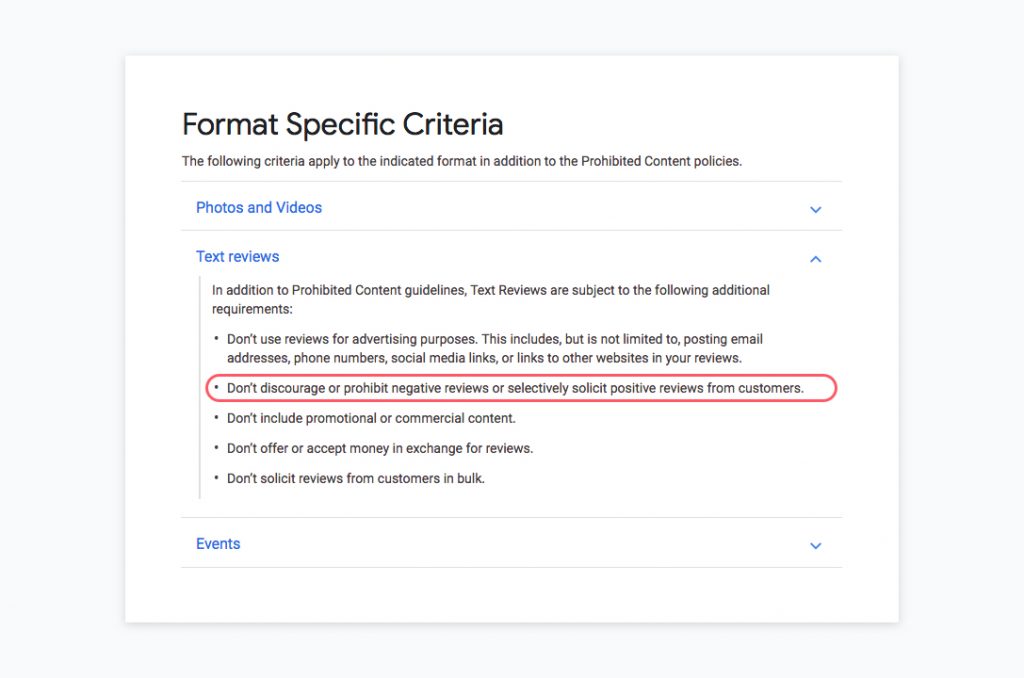
Does Birdeye allow review gating?
No. Birdeye does not allow review gating. Read Section 5 of our Terms of Service for complete details.
Birdeye collaborated with the Google Maps team and updated Birdeye to comply with the new review gating rules.
We have also launched several new features to crack down on fake reviews. These include:
- Stricter user authentication for Birdeye reviews using a Google or Facebook login
- Tighter review content relevance requirements
- Enhanced spam and slander detection algorithms
Businesses that use Birdeye to collect and manage reviews know all the reviews they receive are authentic and ungated. Thus, they can ensure that their prospective customers see an accurate representation of their business via Google reviews.
Birdeye’s review generation process to stop review gating
Businesses using Birdeye can get all the reviews using three different workflows. These workflows are designed to prohibit review gating and have been validated by Google review gating policy.
1. Sends review requests to all your customers
Birdeye integrates with 300+ CRMs and customer management software to automate the workflow. After a customer visits a local business, they automatically receive a review request email or text. The customer can also leave review on a third-party site. All these options are provided to all customers, regardless of their sentiment (positive or negative).
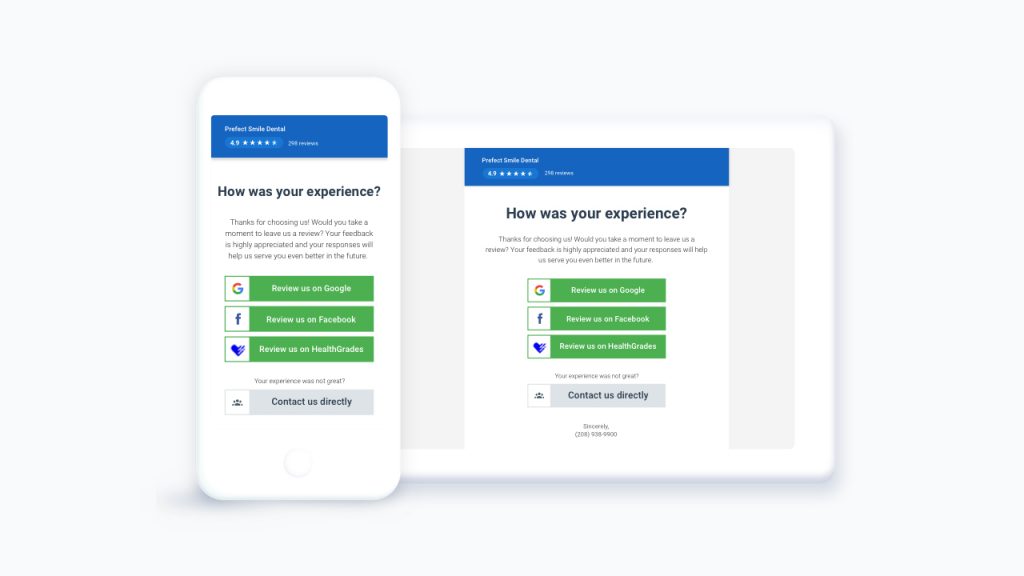
2. Combines customer experience and third- party reviews
Many businesses we work with want to measure their Net Promoter Score (NPS) or Customer Satisfaction Score (CSAT) at every touchpoint in the customer journey. Most businesses also opt to collect third-party customer reviews during these interactions.
Birdeye allows businesses to set up 2-in-1 customer experience templates to measure satisfaction internally while simultaneously soliciting reviews on third-party sites.
The key distinction here is that if the business decides to include third-party review requests in its customer experience template, they must be sent to all customers, regardless of how they score the business on NPS or CSAT.

3. Combines surveys and third-party reviews
Most local businesses leverage Birdeye Surveys to gain in-depth insights into customer experience. Birdeye allows these businesses to include a review request for third-party review sites to boost their online reputation.
However, Birdeye ensures there is no review gating in these surveys. In other words, if a business adds a third-party review request to any survey templates, all customers taking that survey will be given the option to write a third-party review, regardless of the answers they provide in the survey. This promotes the practice to leave honest reviews.
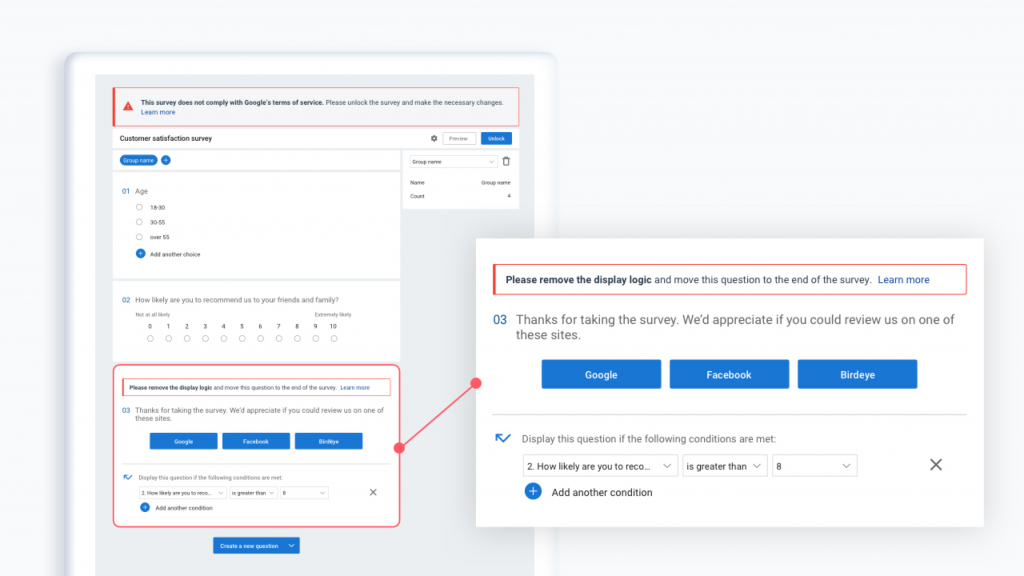
Why is review gating bad for businesses?
Here are three reasons why a company’s approval for review gating can be harmful:
1. You will lose the trust of your customers’ trust and prospective customers
Your customers will only trust your reviews if it’s clear they are authentic and represent an unbiased view of your business. Customers often suspect that perfect 5-star reviews might be fake; so businesses should focus on showcasing authentic reviews, including both positive and negative feedback.
Gating reviews defeats the purpose by leading to disproportionately positive reviews that customers view as less credible. This occurs especially when customers’ experiences don’t match what they read about.
2. Companies like Google are unlikely to publish your reviews if you use gating
If you gate your reviews, Google can likely detect this. They may remove your reviews and/or penalize your business in search engine rankings. Instead of the newly live positive Google reviews boosting your online presence or reputation, it leads to a loss of trust and removal of your listings from prominent public review sites.
Customers can also report reviews if they know they are fake reviews. Too many reports can cause Google and other review sites to block your profile.
3. Review gating doesn’t help you get ahead
Birdeye has accumulated review data for global businesses over the past several years.
We looked at review ratings and conversion data for businesses that used Review Gating (prior to Google releasing their policy on review gating in April 2018) vs. businesses that did not use Review Gating (or subsequently turned it off after the Google policy change).
We observed that businesses not using review gating increased their review count without any meaningful dent in their ratings. Your best action is to not practice review gating. It also helps to build customer trust by collecting reviews for all customer interactions
Understanding all points of view about your business can help you improve aspects of your operations that you may not have even considered hadn’t even thought of before.
Besides, negative customer reviews aren’t a bad thing. They help prove to prospective customers that your reviews represent real experiences, making them trust the positive ones even more.
Pro Tip: You can improve customer trust in your business by always responding to negative reviews and working on the highlighted issues. Birdeye enables businesses to manage negative reviews with our AI-powered review management systems and auto-create tickets for negative reviews so that the team can work on improving customer experience.
Birdeye and Google partnership to combat review gating
Birdeye has partnered with Google and has API integrations for each step of the review process. That includes a private API integration for getting new reviews, automating review response, and displaying maps and reviews on your business profile.
The private API integration simplifies the review process and verifies that the users leaving the reviews are genuine.
In addition, Birdeye also integrates with CRM software such as Salesforce, HubSpot, ServiceTitan, and Yardi. Such integration helps to automate review request solicitation and generate new reviews in one place.
If you’re a channel partner or reseller, review gating is still bad
Suppose you have chosen Birdeye as your trusted partner for reputation management or customer experience management.
In that case, it’s our responsibility to ensure that you and your businesses comply with the policies of all third-party platforms— be it Google, Facebook, or any vertical-specific review site. Review gating is harmful to you and your customers for the same reasons listed above.
The review process applies equally to channel partners and reseller forms. Businesses should avoid it in all scenarios.
FAQs on review gating
Review gating is a practice where businesses filter customer feedback or reviews before publicly posting them. It involves soliciting customer feedback and selectively displaying more positive reviews while suppressing negative ones.
Review gating is generally considered unethical and against the guidelines of most review platforms, including Google and Yelp. Google review gating policy discourage businesses from selectively displaying reviews, as they can mislead consumers.
Review gating is frowned upon because it distorts the overall perception of a business’s reputation by hiding negative feedback. This can mislead potential customers and undermine the importance that unbiased reviews are meant to provide.
If a business is caught using review gating, review platforms may take various actions. These include removing its reviews, penalizing its visibility, or even suspending its account. This can significantly impact the business’s online presence and cause a loss of valuable insights and credibility.
Instead of review gating, businesses can focus on:
– providing exceptional products and services to encourage genuine positive reviews from satisfied customers.
– respond professionally to bad reviews
– demonstrate a commitment to customer satisfaction
– addressing any concerns
Yes, there is a difference. Soliciting reviews is the practice of actively encouraging customers to leave both positive and bad reviews. Review gating happens when businesses only show positive reviews publicly and ask unhappy customers to provide private feedback.
Businesses can improve their online reputation by providing excellent products and services, offering exceptional customer support, engaging with customers through social media and other channels. Also, transparently and constructively responding to positive and negative reviews helps significantly.
Falsely claiming the reviewer isn’t a customer, posting fake positive reviews to bury the negative one, or revealing the customer’s private information are all unethical responses.
Preserving the trust economy with Birdeye
Trustworthy reviews benefit both businesses and customers. That’s why preserving an authentic review ecosystem is the core mission of both Google and Birdeye.
By giving existing customers an outlet to mention reviews, both positive and negative feedback, businesses can acquire new customers while gaining insights into the customer experience. When comparing local businesses, customers consult reviews for reliable, unbiased information so they’re confident in their selections.
Work with Birdeye, the leading name in reputation and customer experience management. With Birdeye, you can embed transparency in your review management, acquire authentic customer feedback, and become a trustworthy name in your industry.
Our partnership with Google is a testament to our commitment to helping businesses put their true selves forward and reach their target customers. Ready to embrace all positive and negative reviews with Birdeye? Watch a demo now.

Originally published


